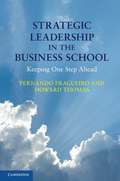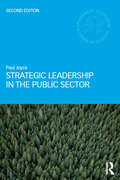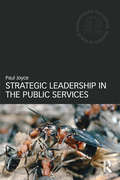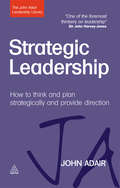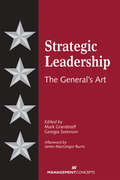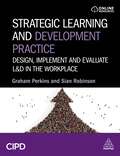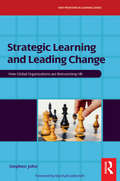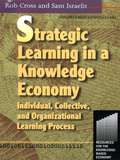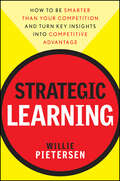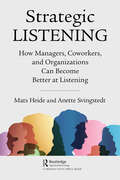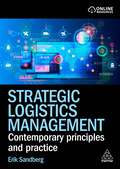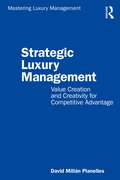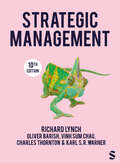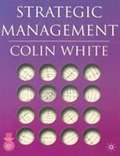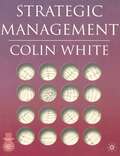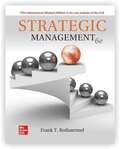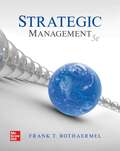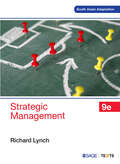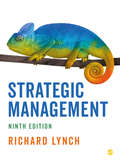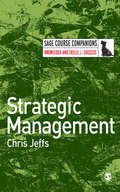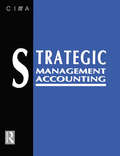- Table View
- List View
Strategic Leadership in the Business School
by Fernando Fragueiro Howard ThomasBusiness schools have come under fire in recent years with criticisms centring on their academic rigour and the relevance of business education to the 'real' world of management. Alongside this ongoing debate, increasing international competition and media rankings have led to a fierce struggle between business schools for positioning and differentiation. These are among the challenges that are faced by the Dean of the modern-day business school. In this book, Fernando Fragueiro and Howard Thomas show how Deans of business schools can meet such challenges in terms of strategic direction setting and the execution of their leadership role. Drawing on their invaluable experience as Deans of highly successful business schools, they present a series of case studies to show how leaders of five leading business schools (IMD, LBS, INSEAD, IAE and Warwick) have built effective strategies in the context of internal and external political pressures.
Strategic Leadership in the Public Sector (Masters in Public Management)
by Paul JoyceIn good times and bad, in the different situations of renewal, crisis, and chronic resource constraints, the strategic leadership of public services is crucial. Good leaders are essential in helping the public sector to adapt and solve ‘wicked’ problems, and they are also integral to the reform and modernization of public governance. This new edition of Strategic Leadership in the Public Sector continues to provide insights into useful approaches and techniques for strategic leaders, looking at: what is expected of leaders competency frameworks leadership theories techniques and processes of strategic leadership leading strategic change the strategic state emerging leadership challenges. Replete with real-world case studies and examples, and including new material from the USA, Canada, Australia, Europe and India, plus an appendix with practical worksheets, the book gives students a truly international outlook on the subject and offers a clear understanding of the significance of leadership, strategic management and public services reform. This textbook represents essential reading for postgraduate students on public management degrees and aspiring or current public managers.
Strategic Leadership in the Public Services
by Paul JoyceIn turbulent times, strategic leadership of public services becomes ever more important. Strategic leaders are steering their organizations into a new relationship with the public, often in conditions of intensified competition between public services providers and thus the quality of leadership they offer is critical. Providing insights into useful approaches and techniques for strategic leaders, Strategic Leadership in the Public Services covers topics such as the nature of leaders and how leaders lead. It probes strategic thinking and thoroughly explores strategic processes of implementation, monitoring and evaluation. It provides advice on being strategic and encourages the reader to appreciate the challenges of strategic leadership in practice. In the end, the book argues that leadership and strategy have become hegemonic ideas for reinventing the state. Replete with real world practical case studies and examples, drawn from a range of countries, the book provides students with a truly international outlook on the subject and offers a clear understanding of the emerging significance of leadership, strategic management, and public services reform. Essential reading for postgraduate students taking leadership and management courses for the public services, the book will also be a useful resource for individuals currently pursuing executive management careers in the public services, or hope to do so in the future.
Strategic Leadership: How to Think and Plan Strategically and Provide Direction
by John AdairA strategic leader is essentially the leader of any organization and someone who has to steer the company in times of change, whilst motivating and inspiring their team.Strategic Leadership from the renowned leadership expert John Adair encourages leaders to focus on tomorrow rather than yesterday. It explores the nature and origin of strategic leadership, transferable skills and the art of inspiring others. It then describes the role itself and broad functions of that role such as building and maintaining a team, achieving a common task and motivating and developing the individual. It moves on to assess the skills you need to be effective, and the seven generic functions that make up the role of strategic leader which include providing direction, strategic thinking and planning, building partnerships and developing tomorrow's leaders. Full of checklists, summaries and historical examples, Strategic Leadership will encourage you to ask the right questions whilst defining the role and skills of a strategic leader.
Strategic Leadership: The General's Art
by Georgia Sorenson Mark R. GrandstaffThink Like a General…Lead Like an Executive"At their center, great organizations such as America's armed forces are the product of great leaders. This fantastic book reveals the keys to success within the military culture, as well as relevant and practical application tools for creating strong leaders today." —Stephen R. Covey, author of The 7 Habits of Highly Effective People and The 8th Habit: From Effectiveness to GreatnessWhat distinguishes strategic leadership? According to top U.S. Army generals, the difference lies in the discipline of thinking. Because the problems strategic leaders face are often multi-faceted and can involve ethical dilemmas, these leaders must move beyond thinking tactically and take a longer term, broader approach to finding solutions. Through the U.S. Army War College and other senior-service colleges, the Army teaches strategic thinking to its officers, developing some of the most esteemed leaders of our time.Strategic Leadership: The General's Art provides aspiring leaders with an understanding of the behavior and competencies that make a good strategic leader. In line with the curriculum followed by senior officers attending the U.S. Army War College, this book teaches leaders how to think strategically in a volatile, uncertain environment and thereby to provide transformational leadership and shape outcomes.With contributions from senior military leaders as well as experts in the fields of strategic leadership, systems and critical thinking, and corporate culture, this invaluable reference shows readers how to move from mid-level manager to strategic-thinking senior executive.Strategic Leadership: The General's Art provides aspiring leaders with an understanding of the behavior and competencies that make a good strategic leader. In line with the curriculum followed by senior officers attending the U.S. Army War College, this book teaches leaders how to think strategically in a volatile, uncertain environment and thereby to provide transformational leadership and shape outcomes.With contributions from senior military leaders as well as experts in the fields of strategic leadership, systems and critical thinking, and corporate culture, this invaluable reference shows readers how to move from mid-level manager to strategic-thinking senior executive.
Strategic Learning and Development Practice: Design, Implement and Evaluate L&D in the Workplace
by Graham Perkins Sian RobinsonDesigned to support aspects of the CIPD's advanced diplomas the CIPD Advanced Diploma in Strategic Learning and Development and equip students with the skills needed to embark on a career in L&D.Offering essential coverage of the underpinning theory of learning and development, this book explores key learning models, learning styles and an examination of how people learn. Building on these theoretical foundations, Strategic Learning and Development Practice goes on to explore how this theory applies in practice, including identifying learning needs, learning analytics, knowledge management, technology-supported learning and how to build and evaluate an L&D strategy. This book is full of real-world examples and pedagogical features to support student learning. These include reflective practice questions to consolidate learning and promote critical thought as well as explore further boxes to facilitate wider reading and encourage students to explore areas of interest in more depth. Key definitions in this book give a clear outline of the essential terms and key learning points at the end of every chapter support student revision of the most important themes. Online resources include a lecturer manual and PowerPoint slides for each chapter.
Strategic Learning and Leading Change (New Frontiers In Learning Ser.)
by Stephen JohnStrategic Learning and Leading Change is a practical, inspiring read that challenges business commentators who have doubted the power of HR and presents examples of how HR leaders are leading change to truly earn their seats as business partners at the strategy table. Using real-life examples that take in the intricacies of performance management, talent management and leadership development, the book shows business leaders how to improve strategy execution and interact with the board. Structured in three parts, the book covers: * The globalization of business and its impact on strategy, structure, operating processes and culture * Global team-based organization and change leadership, using the in-depth case study of APC, a company that reinvented the Pharma business model * The reinvention and changing role of HR in today's global organizations Written for senior business leaders, HR leaders and managers who are working in or planning to enter a global business environment, Strategic Learning and Leading Change is also ideal for management consultants who advise business and HR leaders on leveraging learning and change with an emphasis on improving strategy execution. It is also a perfect real-world text for students on human resources courses and business MBAs who aspire to drive success in a global business and HR setting.
Strategic Learning in a Knowledge Economy
by Robert L Cross Sam IsraelitStrategic Learning in a Knowledge Economy defines unique and powerful ways that organizations can foster learning at the individual, group and organizational levels, a capability critical to both strategic objectives and business performance. The book explains how individuals and organizations learn, clarifying cognitive and social aspects of the topic. Readers will understand how learning enables organizations and individuals to better create, assimilate, and transfer knowledge. Strategic Learning in a Knowledge Economy helps managers create individual and collective processes that maximize the quality of the knowledge created and learned and ensures this knowledge is effectively used. The book appropriately redefines the frequently narrow and technology-oriented view of learning and explains how an effective learning strategy ensures that a broad base of employees learn and implement vital organizational lessons. Strategic Learning in a Knowledge Economy features focused discussions of organizational core competencies, learning and innovation, communities of practice, assessing organizational learning capabilities, and other important learning topics. This authoritative compendium helps readers master organizational issues crucial in today's knowledge economy by:
Strategic Learning: How to Be Smarter Than Your Competition and Turn Key Insights into Competitive Advantage
by Willie PietersenHow to use Strategic Learning to rapidly respond to change and gain a sustainable advantage over your competitors What's even harder than creating a breakthrough strategy? Making it stick. <P><P>As companies are fighting to survive in a tough economy, this new book by Willie Pietersen demonstrates the power of the Strategic Learning process, a four-step dynamic cycle guaranteed to create and sustain winning performance. Adopted by a wide range of corporations and not-for-profit organizations, the Strategic Learning process builds on eight years of practicing, adapting and honing the original concepts Pietersen first introduced in Reinventing Strategy to explain how organizations can generate superior insights about their customers and competitors, craft a Winning Proposition, focus on a vital few key priorities, create buy-in throughout the organization and achieve success - again and again. Teaches organizations to make smarter decisions that help them win customers and earn superior profits Explains how to instill a culture of openness, learning, and courage that can face and respond to the constantly changing business environment Is a tool that can benefit leaders at all levels, in organizations both large and small, global and domestic, for-profit and not-for-profit Author Willie Pietersen, a former president of Tropicana and Seagram USA, is a professor of management at Columbia Business School, and the author of Reinventing Strategy, from Wiley Strategic Learning shows you how your business or nonprofit organization can develop better, more effective strategies for long-term competitive advantage.
Strategic Listening: How Managers, Coworkers, and Organizations Can Become Better at Listening
by Mats Heide Anette SvingstedtListening is so simple, yet so difficult. Many times, listening is taken for granted. One could therefore say that listening is the forgotten part of communication. Although organizations have more digital and analog communication channels than ever, too little time is spent listening to customers, employees, and other influential groups. It is a shame that listening is not given more attention, as it is linked to many positive values. Examples include better conversations, increased trust and confidence, more outstanding commitment and job satisfaction, lower absenteeism due to illness, higher productivity and quality of work, increased sales, better relationships with customers and employees, and many other positive effects. To the extent that listening takes place, organizations rarely take a holistic approach to it. Strategic listening means a given objective for listening, thoughts about who should listen, when it should happen, and so on. An organization’s listening must become a strategic issue to exploit the great potential of increased listening. This book provides answers to the following: Why is listening important? What are the barriers to listening? How can both individuals and organizations become better at listening? How can organizations develop strategic listening skills? How does one build a system to improve an organization’s strategic listening?
Strategic Logistics Management: Contemporary Principles and Practice
by Erik SandbergLogistics and Supply Chain Management students will gain a fundamental understanding of how to manage logistics strategically with this new textbook.Going outside the traditional logistics and supply chain management domain, Strategic Logistics Management applies strategic management theories to further understand the role and relevance logistics management plays in many companies' sustainable competitive advantage. This textbook offers new insights to understanding and managing logistics management, and provides a comprehensive overview of the intersection between strategic management perspectives, such as market positioning and dynamic capabilities, and logistics and supply chain management practices. It presents a useful ground and new arguments for how to understand the role logistics management when strategizing, providing the reader with the necessary knowledge to understand and analyse this as a role.Throughout, this text illustrates the major managerial themes relevant to contemporary logistics management contexts such as:- logistics development- paradoxes- supply chain resilience- logistics-based business models- circular supply chainsThis informative text is supported by a range of features including chapter outlines, chapter summaries, as well as discussion and study questions at the end of each chapter, to aid development. There are also international real-world examples from companies such as Lidl, Apple and H&M.Strategic Logistics Management is an essential resource for postgraduate level students on Logistics and Supply Chain Management degrees and courses. Online resources include lecturer slides, an instructor's manual and additional comments on the study questions.
Strategic Luxury Management: Value Creation and Creativity for Competitive Advantage (Mastering Luxury Management)
by David Millán PlanellesStrategic Luxury Management is a case-rich and practical overview of how luxury creates value and why some firms are more successful than others. The focus of luxury study has traditionally centered on the clients’ drivers of consumption, their perception of the brand and the way to effectively engage with them. Luxury is rarely, however, discussed from a strategic perspective: how luxury managers make complex decisions relative to their competitive environment. The book provides insight into the luxury industry and how companies face market complexity across three key areas. First, the company itself, determining what defines a luxury firm. Second, the book offers a specific framework to assess creativity across management and not simply as an individual talent. Third, the book considers the competitive landscape and the principles that allow companies to compete consistently and meaningfully. Each chapter includes pedagogical features to ensure comprehension, including chapter objectives and self-study questions. With examples and case studies from international firms illustrating each chapter, Strategic Luxury Management is essential reading for postgraduate, MBA and executive education students studying luxury management, luxury brand management, luxury creativity and innovation, and strategic management, as well as reflective practitioners within the luxury industry. Online resources include chapter-by-chapter PowerPoint slides.
Strategic Management
by Allen AmasonLeadership, adaptability, value creation. These are the skills necessary for tomorrow's managers. Allen Amason approaches the topic of strategic management with these traits in mind. Rather than simply teaching theory and research, he seeks to communicate to them the fundamental keys to how strategy works. This book is designed to help students think critically and understand fully how to strategically manage their future firms. In so doing, it will enable them to adapt and learn, even as their circumstances change; to apply sound logic and reasoning, even in new and unfamiliar settings. By conveying enduring and fundamental principles of economic and human behavior rather than simply reporting on the latest innovations, this book succeeds in preparing students to excel in the business environment over time, regardless of how it evolves.
Strategic Management
by Richard Lynch Oliver Barish Vinh Sum Chau Charles Thornton Karl S. WarnerTaking a truly international approach, Strategic Management offers you comprehensive coverage of all the core areas of business strategy in a reader-friendly way. Thoroughly updated and with the addition of four brand-new authors, the tenth edition features: • Balanced treatment of prescriptive and emergent models of strategic management. • Application of strategic theory to key areas such as technology and innovation, sustainability, entrepreneurial and public sector strategy. • Cutting-edge content on navigating change in the strategic environment, digital transformation strategies and the role of strategic groups. • 15 brand new case studies showcasing real-life examples from recognisable brands such as Coca-Cola, Airbnb, Apple, Tesla, Toyota, Alibaba, Samsung, Starbucks and UK banks, plus updated case material throughout. • A range of practical tools to support your learning, including summaries of key strategic principles, strategic project ideas, critical reflections, questions and further reading. Suitable for both undergraduate and postgraduate study. Professor Richard Lynch is Emeritus Professor of Strategic Management at Middlesex University, London. Dr Oliver Barish is Lecturer in Management at Birkbeck Business School, Birkbeck, University of London. Dr Vinh Sum Chau is Senior Lecturer in Strategy at Kent Business School, University of Kent. Dr Charles Thornton is Lecturer in Service Operations Management and Business Strategy at Plymouth Business School, University of Plymouth. Dr Karl Warner is Lecturer in Strategy at Adam Smith Business School, University of Glasgow.
Strategic Management
by Richard Lynch Oliver Barish Vinh Sum Chau Charles Thornton Karl S. WarnerTaking a truly international approach, Strategic Management offers you comprehensive coverage of all the core areas of business strategy in a reader-friendly way. Thoroughly updated and with the addition of four brand-new authors, the tenth edition features: • Balanced treatment of prescriptive and emergent models of strategic management. • Application of strategic theory to key areas such as technology and innovation, sustainability, entrepreneurial and public sector strategy. • Cutting-edge content on navigating change in the strategic environment, digital transformation strategies and the role of strategic groups. • 15 brand new case studies showcasing real-life examples from recognisable brands such as Coca-Cola, Airbnb, Apple, Tesla, Toyota, Alibaba, Samsung, Starbucks and UK banks, plus updated case material throughout. • A range of practical tools to support your learning, including summaries of key strategic principles, strategic project ideas, critical reflections, questions and further reading. Suitable for both undergraduate and postgraduate study. Professor Richard Lynch is Emeritus Professor of Strategic Management at Middlesex University, London. Dr Oliver Barish is Lecturer in Management at Birkbeck Business School, Birkbeck, University of London. Dr Vinh Sum Chau is Senior Lecturer in Strategy at Kent Business School, University of Kent. Dr Charles Thornton is Lecturer in Service Operations Management and Business Strategy at Plymouth Business School, University of Plymouth. Dr Karl Warner is Lecturer in Strategy at Adam Smith Business School, University of Glasgow.
Strategic Management
by Colin WhiteReflecting the challenges of formulating, implementing and monitoring strategy in practice, White's contemporary text discusses differing theories and approaches in the context of real-world experience. Readers are encouraged to conceptualize and generalize business problems and to confront philosophical issues without losing sight of practical aims. Each chapter starts with a Key Strategic Challenge and sets the scene of a case study which is resolved at the end of the chapter. The text includes more than sixty Strategy in Action short case examples to illustrate how organizations apply strategy in practice along with fifteen long case studies for detailed analysis. Strategic Projects and Exploring Further sections encourage readers to investigate the subject more in detail. Strategic Management: * Acknowledges the complex reality of strategy in the real world showing students the challenges they will encounter when implementing strategy in practice. * Provides a solid theoretical grounding in the subject enabling students to develop their own strategic approaches. * Offers comprehensive and contemporary topic coverage reflecting current trends such as globalization, co-operative strategy and performance measurement. * Includes separate chapters on Implementation, Monitoring and Risk Assessment reflecting the critical role of these issues within organizations. * Provides a wide range of international case examples from well-known organizations in all regions of the world allowing students to see how strategy is implemented in practice and reflecting the global nature of strategy for multinational corporations. Integrated web packages include: * FOR STUDENTS: Additional long case studies, integrating case study, links to further resources, searchable glossary. * FOR INTRUCTORS: Suggested teaching pathways and key themes, additional case study questions, comments on exercises and assignments within the text, powerpoint lecture presentations. Visit www. palgrave. com/business/white for more information.
Strategic Management
by Colin WhiteReflecting the challenges of formulating, implementing and monitoring strategy in practice, White's contemporary text discusses differing theories and approaches in the context of real-world experience. Readers are encouraged to conceptualize and generalize business problems and to confront philosophical issues without losing sight of practical aims.Each chapter starts with a Key Strategic Challenge and sets the scene of a case study which is resolved at the end of the chapter. The text includes more than sixty Strategy in Action short case examples to illustrate how organizations apply strategy in practice along with fifteen long case studies for detailed analysis. Strategic Projects and Exploring Further sections encourage readers to investigate the subject more in detail.Strategic Management:* Acknowledges the complex reality of strategy in the real world showing students the challenges they will encounter when implementing strategy in practice.* Provides a solid theoretical grounding in the subject enabling students to develop their own strategic approaches.* Offers comprehensive and contemporary topic coverage reflecting current trends such as globalization, co-operative strategy and performance measurement.* Includes separate chapters on Implementation, Monitoring and Risk Assessment reflecting the critical role of these issues within organizations.* Provides a wide range of international case examples from well-known organizations in all regions of the world allowing students to see how strategy is implemented in practice and reflecting the global nature of strategy for multinational corporations.Integrated web packages include:* FOR STUDENTS: Additional long case studies, integrating case study, links to further resources, searchable glossary.* FOR INTRUCTORS: Suggested teaching pathways and key themes, additional case study questions, comments on exercises and assignments within the text, powerpoint lecture presentations. Visit www.palgrave.com/business/white for more information.
Strategic Management
by Frank T. RothaermelFrank T. Rothaermel wrote Strategic Management 6e from the ground up because the world has changed dramatically since 5e was published (in January 2020). Events such as the COVID-19 pandemic, social justice movements, war, and disenchantment with the economic system profoundly impact how leaders run companies in their quest for competitive advantage. Rothaermel 6e synthesizes and integrates conceptual frameworks, empirical research, and practical applications with current real-world examples to help students make sense of a fast-changing and complex world. <p><p>Rothaermel 6e is industry-leading in diversity and inclusion by featuring leaders with different backgrounds and companies that today’s students can relate to and thus internalize the knowledge acquired. The new 6e prepares students with the foundation they need to understand how companies gain and sustain competitive advantage while developing skills to become successful leaders capable of making well-reasoned strategic decisions.
Strategic Management
by Frank T. RothaermelStrategic Management, 5e by Frank T. Rothaermel is the fastest growing Strategy title in the market because it uses a unified, singular voice to help students synthesize and integrate theory, empirical research, and practical applications with current, real-world examples. His approach not only offers students a learning experience that uniquely combines rigor and relevance, but also provides tight linkage between the concepts and cases. Rothaermel 5e prepares students with the foundation they need to understand how companies gain and sustain competitive advantage, while developing students’ skills to become successful future leaders capable of making well-reasoned strategic decisions.
Strategic Management
by R. Edward FreemanStrategic Management: A Stakeholder Approach was first published in 1984 as a part of the Pitman series in Business and Public Policy. Its publication proved to be a landmark moment in the development of stakeholder theory. Widely acknowledged as a world leader in business ethics and strategic management, R. Edward Freeman's foundational work continues to inspire scholars and students concerned with a more practical view of how business and capitalism actually work. Business can be understood as a system of how we create value for stakeholders. This worldview connects business and capitalism with ethics once and for all. On the 25th anniversary of publication, Cambridge University Press are delighted to be able to offer a new print-on-demand edition of his work to a new generation of readers.
Strategic Management
by Richard LynchA time-tested book that not only explores the basic concepts of strategic management but also links them with new thinking and technologies. Strategic Management is a combination of well-established concepts coupled with new ideas and challenges. The book argues that both the rational approach and the creative approach to strategic management are essential to enable students and practising managers to develop effective strategies. The creative aspects remain a unique feature of this text. This textbook presents the practical issues and problems of strategic management so that the compromises and constraints of real organisations are considered. The text also aims to stimulate critical appraisal of the major theories among its readers and explores the application of strategic theory to new areas. Key Features:- • Over 50 case studies explaining the various concepts of strategic management from companies such as Pepsico and Unilever • Uses a two-model structure including the rational approach and the creative approach that provides a holistic view of the subject • Contains extensive coverage of international strategy issues and includes examples from the USA and Europe as well as China, India and Africa • Explores new topics such as the new thinking in strategic knowledge, entrepreneurship and globalisation, plus the continuing issues linked to sustainability and green strategy
Strategic Management
by Richard LynchThe 9th edition of this comprehensive core textbook builds on its global perspective and approachable written style, as it explores the key concepts within a clear and logical structure. Lynch guides you through 19 chapters, with updated case studies and pedagogy that support the modern business and management student from start to finish. Continuous contrast between prescriptive and emergent views of strategy highlights key debates within the discipline, whilst an emphasis on the practical throughout the book helps you turn theory into practice
Strategic Management
by Richard LynchThe 9th edition of this comprehensive core textbook builds on its global perspective and approachable written style, as it explores the key concepts within a clear and logical structure. Lynch guides you through 19 chapters, with updated case studies and pedagogy that support the modern business and management student from start to finish. Continuous contrast between prescriptive and emergent views of strategy highlights key debates within the discipline, whilst an emphasis on the practical throughout the book helps you turn theory into practice
Strategic Management (SAGE Course Companions series)
by Mr Chris JeffsThe Sage Course Companion on Strategic Management is an accessible introduction to the subject that avoids lengthy debate in order to focus on the core concepts. It will help the reader to develop their understanding of the key theories, whilst enabling them to bring diverse topics together in line with course requirements. The Sage Course Companion also provides advice on getting the most from your course work; help with analysing case studies and tips on how to prepare for examinations. Designed to compliment existing strategy textbooks, the Companion provides: - Quick and easy access to the key themes in strategic management - Tips on how to effectively use theory and avoid common errors - Typical examination questions, with outline approaches to the answers - 'Taking it Further' sections that provide a critical discussion of the theory and its applicability to business situations - A glossary of strategic management terminology - A textbook guide directing the reader to additional supporting material The Sage Course Companion on Strategic Management is much more than a revision guide for undergraduates; it is an essential tool that will help readers take their understanding to new levels and help them achieve success in their course. Postgraduate students and those taking professional courses will also find this book acts a us.
Strategic Management Accounting
by Keith Ward* Challenging and provocative book * Shows how management accounting techniques can be integrated into the strategic decision making process * Extensive use of practical examples from a variety of contexts.An introduction to business strategy for management accountants, financial accountants or managers with an accounting orientation. The book places management accounting clearly within the context of strategic management of the business. Offers qualified accountants a sound introduction to strategic management, and with practical examples and mini-cases provided throughout, this book is comprehensive yet concise. Keith Ward addresses strategic management accounting as a continuous process of analysis, planning and control. Management accounting is about supplying the right information to the right people at the right time, and this can only be expressed in the context of the business strategy and strategic plan. The implementation of appropriate management accounting systems to complement different strategies is discussed in detail. Applications and examples include multinational organizations, non-profit organizations and varying organizational structures. Finally the author covers methods of using management accounting for strategic advantage.
